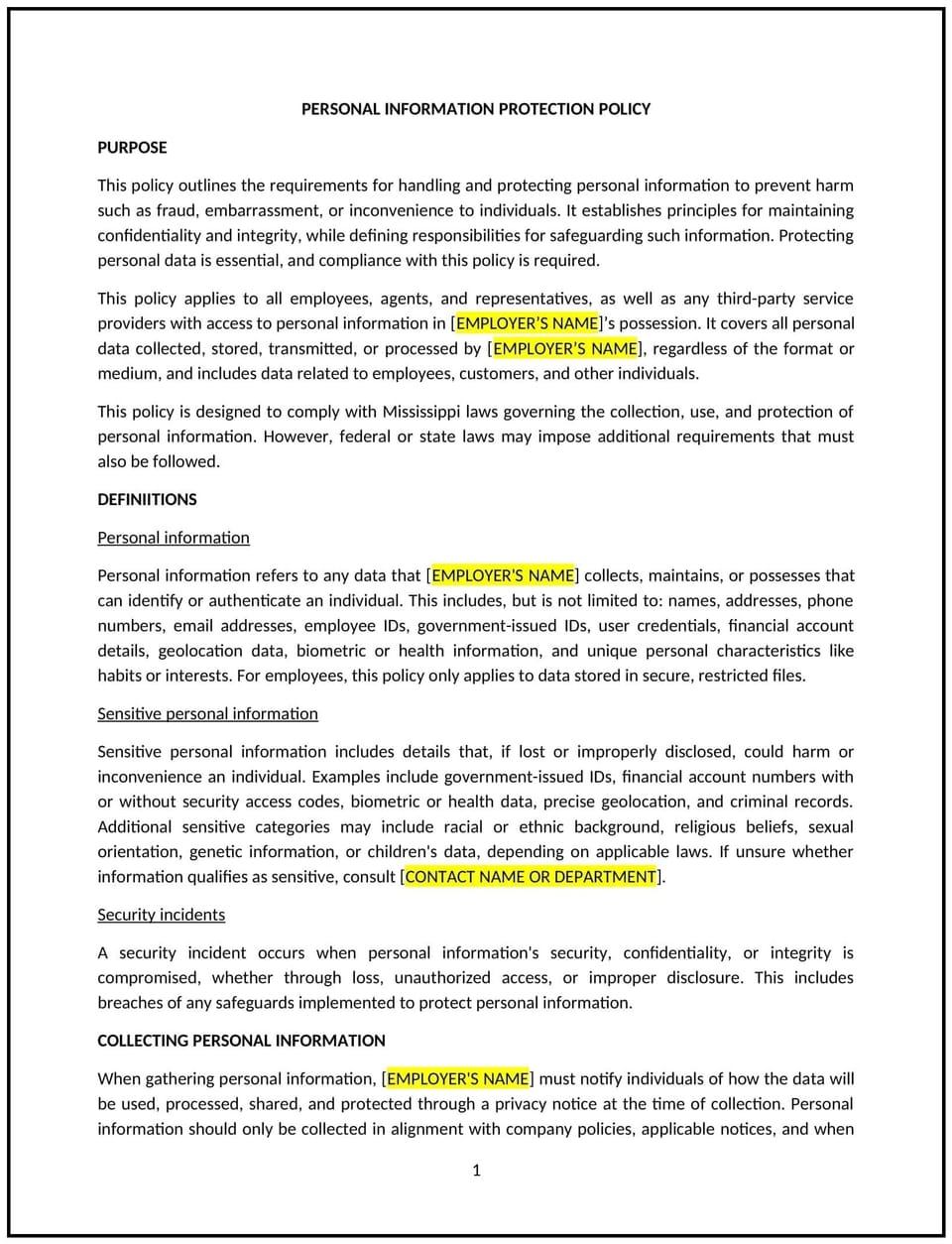Personal information protection policy (Mississippi): Free template

Personal information protection policy (Mississippi)
A personal information protection policy outlines how Mississippi businesses handle, store, and protect employees' and customers' sensitive data. This policy helps businesses safeguard personal information from unauthorized access, data breaches, and misuse. It also establishes clear guidelines for data collection, retention, and disposal.
By implementing this policy, businesses can build trust with employees and customers while promoting responsible data management practices.
How to use this personal information protection policy (Mississippi)
- Define personal information: Specify the types of personal data covered by the policy, such as names, Social Security numbers, financial records, and contact details.
- Limit data collection: Collect only the information necessary for business operations and employee records.
- Establish secure storage methods: Outline procedures for securely storing personal data, including encryption, password protection, and access controls.
- Restrict access: Limit access to personal information to authorized personnel only and implement role-based permissions.
- Set data retention periods: Define how long personal information will be stored and the process for securely disposing of outdated or unnecessary records.
- Address data sharing: Specify when and how personal data may be shared with third parties, such as service providers or regulatory agencies.
- Implement breach response procedures: Establish steps for handling data breaches, including notifying affected individuals and taking corrective measures.
- Train employees on data protection: Educate staff on best practices for handling and securing personal information.
- Review and update the policy regularly: Adjust the policy as needed to reflect changes in technology, business operations, or regulatory requirements.
Benefits of using this personal information protection policy (Mississippi)
This policy offers several benefits for Mississippi businesses:
- Strengthens data security: Helps prevent unauthorized access and data breaches.
- Protects employee and customer trust: Demonstrates a commitment to safeguarding sensitive information.
- Reduces legal and financial risks: Minimizes the potential for data-related liabilities and reputational damage.
- Enhances business reputation: Establishes the business as a responsible data steward.
- Improves operational efficiency: Creates standardized procedures for handling and storing personal data.
Tips for using this personal information protection policy (Mississippi)
- Communicate the policy to employees: Ensure all staff members understand their role in protecting personal data.
- Use strong security measures: Implement encryption, firewalls, and access controls to safeguard digital records.
- Monitor access to sensitive data: Regularly audit data access logs to detect unauthorized use or potential security threats.
- Require confidentiality agreements: Have employees sign agreements outlining their responsibilities for handling personal information.
- Establish a data breach response plan: Develop a clear process for identifying, reporting, and mitigating security incidents.
- Regularly review data handling practices: Update security protocols and privacy measures as business needs evolve.
Q: Why should Mississippi businesses implement a personal information protection policy?
A: A structured policy helps businesses manage and protect sensitive data, reducing security risks and fostering trust among employees and customers.
Q: What types of personal information should businesses protect?
A: Businesses should safeguard data such as employee and customer names, addresses, Social Security numbers, financial records, and medical information.
Q: How can businesses prevent unauthorized access to personal information?
A: Businesses should implement access controls, encryption, password protection, and employee training to prevent unauthorized access.
Q: How long should businesses retain personal information?
A: Retention periods vary based on business needs and legal requirements. Businesses should define timelines and securely dispose of outdated records.
Q: What should businesses do in the event of a data breach?
A: Businesses should have a response plan in place, including notifying affected individuals, investigating the cause, and implementing corrective measures.
Q: Can businesses share personal information with third parties?
A: Yes, but businesses should only share data with authorized third parties and ensure contracts include confidentiality and security requirements.
Q: How can employees help protect personal information?
A: Employees should follow security protocols, report suspected breaches, and avoid sharing sensitive information without proper authorization.
Q: How often should this policy be reviewed?
A: Businesses should review and update the policy at least annually to reflect changes in data protection practices and regulations.
This article contains general legal information and does not contain legal advice. Cobrief is not a law firm or a substitute for an attorney or law firm. The law is complex and changes often. For legal advice, please ask a lawyer.


